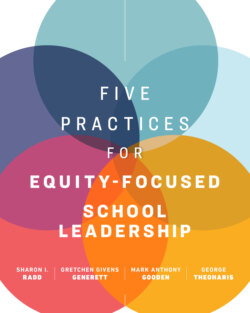Читать книгу Five Practices for Equity-Focused School Leadership - Sharon I. Radd - Страница 25
На сайте Литреса книга снята с продажи.
"My colleagues aren't capable/cooperative/invested."
ОглавлениеEducators who feel they are further along in their thinking about equity, or who possess a particular commitment or passion they believe is not shared by their colleagues, may tell this story. A variety of teacher leaders—some with strong commitments to equity, some with great pedagogical talents, some with deep content or leadership strengths—may tell this story. Sometimes, those with rich life and educational experiences who understand the complexity of equity and diversity issues struggle when others do not appear to think about equity, or have not had important life experiences around equity and diversity. You might hear, "It's not the kids, it's the adults who make life difficult." This deficit orientation is not about students or families but instead about other educators.
Joy is enrolled in a well-regarded educational leadership preparation program and widely respected as an excellent teacher leader. She is deeply reflective, embraces a complex understanding of equity, and possesses a strong commitment to her students. In her graduate classes, Joy naturally reveals her wisdom and skills through conversation and written work, yet simultaneously laments, "[My school] never gets anywhere because my colleagues don't get it. They are not invested in making our school better and are incapable of this work … so I just close my door and get it done with my students." She felt her only path to self-preservation was to leave others to continue inequitable work so she could do her best in her own classroom.
Note the complexity here. This talented equity-focused teacher leader consistently created more equitable and excellent experiences for all of her students; however, this was paired with a disdain for her colleagues who did not have the same skills or perspective. Her approach may seem self-protective, as people like Joy can experience real frustration when working with colleagues who are resistant to equity changes, hold biased and deficit views of children and families, and engage in practices that are not emancipatory. However, creating more equitable schools requires people like Joy to stay engaged in helping others learn and grow.
Through her graduate program, Joy realized her responsibility to lead beyond her classroom. She wrote, "Leadership toward these [equity] issues I care so much about is about my ability to work with other adults. I have to work to see my colleagues as capable, I have to get them invested… that is my job. I need them and so does this community." Joy learned that she needed to reject a deficit orientation about her colleagues if she wanted to create a more equitable school for her students and families.
